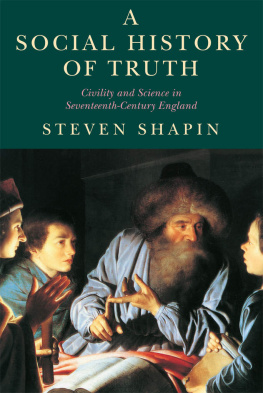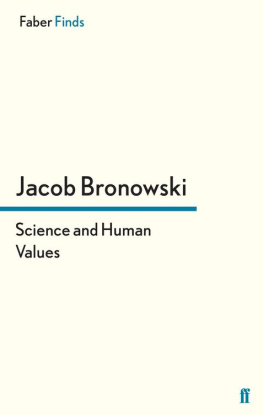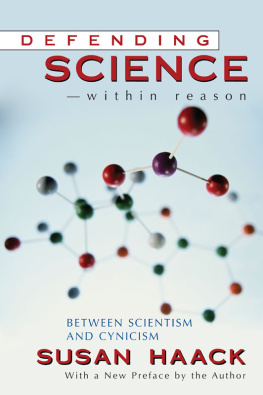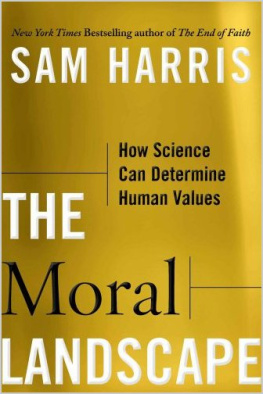2010 The Johns Hopkins University Press
All rights reserved. Published 2010
Printed in the United States of America on acid-free paper
9 8 7 6 5 4 3 2 1
The Johns Hopkins University Press
2715 North Charles Street
Baltimore, Maryland 21218-4363
www.press.jhu.edu
Library of Congress Cataloging-in-Publication Data
Shapin, Steven.
Never pure : historical studies of science as if it was produced by people with bodies, situated in time, space, culture, and society, and struggling for credibility and authority / Steven Shapin.
p. cm.
Includes bibliographical references and index.
ISBN-13: 978-0-8018-9420-6 (hardcover : alk. paper)
ISBN-10: 0-8018-9420-4 (hardcover : alk. paper)
ISBN-13: 978-0-8018-9421-3 (pbk. : alk. paper)
ISBN-10: 0-8018-9421-2 (pbk. : alk. paper)
1. ScienceSocial aspects. 2. ScienceHistory. I. Title.
Q175.5.S465 2010
306.45dc22
2009023834
A catalog record for this book is available from the British Library.
Special discounts are available for bulk purchases of this book. For more information, please contact Special Sales at 410-516-6936 or specialsales@press.jhu.edu.
The Johns Hopkins University Press uses environmentally friendly book materials, including recycled text paper that is composed of at least 30 percent post-consumer waste, whenever possible. All of our book papers are acid-free, and our jackets and covers are printed on paper with recycled content.
Never Pure
Never Pure
Historical Studies of Science
as if It Was Produced
by People with Bodies,
Situated in Time, Space,
Culture, and Society,
and Struggling for Credibility
and Authority
STEVEN SHAPIN

PREFACE
Edinburgh already had a historian of science (in the history department), who politely warned me off his territory and who was mollified only when I suggested that I label my undergraduate survey course The Social History of Science. This, he agreed, would sufficiently differentiate what I was doing from the real thing.
The result of this institutional trajectory, over a period of almost forty years, is a body of writing somewhat more heterogeneous than is typical for historians of science and even for humanist and social scientific academics in general. What Ive done is various in terms of subject matter: I have moved about from the study of phrenology and social aspects of science in industrializing Britain,
For these reasons, I had thought for a while, and more recently had it sug gested to me, that there would be some point in making a selection of articles and contributed chapters and putting them together in book form. On the one hand, readers who knew part of my work often did not know that I had written in other areas or in other idioms; on the other hand, such a collection would be an opportunity to make more visible the sensibilities that connected genres of work often seen as having little to do with each other. What might interest readers also interested me, and I welcomed the opportunity, not just to take a backwards look, but to try to point out what intellectual strands ran through this apparent jumble. The first chapter is an attempt to survey changing sensibilities in the history and social studies of science over the past few decades, and it is both a reflection on what I have done as represented by the contents of this bookand on what has changed over the past several decades in academic historical and sociological engagements with science. Each scholar is a unique product of his or her times, but we are all products of our time. It is never right for historians to think of themselves alone as outside of history.
The rest of the chapters are lightly edited versions of previously published materials. No significant substantive changes have been made, but the opportunity has been taken to make minor stylistic alterations, to correct typographical errors and expository clumsinesses in originals that were sometimes my own fault and sometimes that of aggressive editing, and to add occasional references to work that appeared after the original pieces.
I thank Jacqueline Wehmueller of the Johns Hopkins University Press for seeing some merit in the idea for this book and for her patience during the time it was being prepared; my Harvard colleague Charles E. Rosenberg for suggesting the project; Chris Phillips for working with me in the time-consuming job of getting these papers in suitable form; and two readers for the Press who were gratifyingly positive about the project.
in The Handbook of Science and Technology Studies, 3rd ed., ed. Edward Hackett, Olga Amsterdamska, Michael Lynch, and Judy Wajcman (Cambridge, MA: MIT Press, 2007), pp. 433448.
I am grateful to all the original publishers for permission to use these materials here.
CHAPTER 1
Lowering the Tone in the History of Science
A Noble Calling
Some years ago, a friend summed up what it was I had supposedly accomplished over almost forty years of writing in the history of science. He said that I had lowered the tone. Lowering the tone, Ive come to think, is a positive achievement in our fieldbut its an achievement that belongs to the collective and not to any one individual. So my task is to figure out what my friend might have meant when he said Id lowered the tone, then to share the credit by saying something about how tone-lowering has been a historically situated response to the times in which we live and changes in our objects of study, then, finally and very briefly, to say why this lowering of tone has some intellectual virtue associated with it.
It was several years ago that I was brought face to face with what it meant to lower the tone. I was reading The New Yorker, and there was a story in it by Woody Allen. Posing as a historian, he said hed come across a hitherto unknown textFriedrich Nietzsches Diet Book. Who would have thought, Allen asked, that such a book existed? Is there a relationship between a healthy regimen and creative genius? The powerful will always lunch on rich foods, well seasoned with heavy sauces, while the weak peck away at wheat germ and tofu, convinced that their suffering will earn them a reward in an afterlife where grilled lamb chops are all the rage. But if the afterlife is, as I assert, an eternal recurrence of this life, then the meek must dine in perpetuity on low carbs.
I dont know what I was most miffed at. Was it that a profound intellectual argument about feeding and thinking had been reduced to a shtick? Lesley Chamberlain some years ago wrote a nice piece in The Times Literary Supplement about Nietzsches views on Liebigs Beef Extract And Id meant the piece to be taken seriously. (Sort of a no-chicken non-joke.) Or was I miffed because I didnt get a chance to make the joke myself, since The New Yorker pays rather better than academic publishers? No, the problem is not the opposition between the humor of inversion and intellectual respectability: Woody Allens story about the Nietz sche diet book versus proper academic seriousness. The very idea of the Nietzsche diet book may be profound, but it is funny.
Its funny in pretty much the same way that Monty Pythons Life of Brian is very funny. The thing about the Sermon on the Mount was poor acoustics. What did he say? asked a Hebrew standing at the bottom of the Mount: Blessed are the cheesemakers? Whats so special about the cheesemakers? The response was one of the earliest instances of New Testament hermeneutics: Well, obviously its not meant to be taken literally; it refers to any manufacturers of dairy products. Power, as we now well understand from recent events, has a very dim view of Inconvenient Truths. And so at the core of religionor at least a religion of belief as opposed to one of lawthere is mysterytruths so incredible that you have to make an enormous effort to believe them, things so impossible that you
Next page









